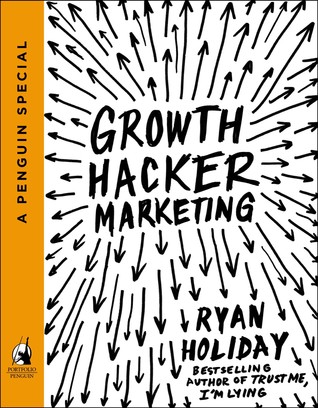Growth Hacker Marketing by Ryan Holiday - Summary and Book Notes
Holiday neatly outlines the tactics and mindset needed to become a growth hacker.
Review
Quick and to the point, Holiday deconstructs the techniques used by growth hackers to make their products spread. I highly recommend this book for anyone involved in the launch of a new product.
Buy Growth Hacker Marketing on Amazon or check it out at your library.
=======
Super Quick Summary
Growth Hacking is cheaper and more effective than traditional markteing. Focus on a small, defined group of users. Measure useful metrics, test new approaches, and get feedback quickly. Bake virality into your product. Make your existing customers excited to share their experience with others.
Quick Notes
The following are rough notes I took while reading. These are mostly paraphrased or quoted directly from the book.
The old way–where product development and marketing were two distinct and separate processes–has been replaced.
Growth Hacking - Build a self-perpetuating marketing machine that reaches millions by itself
Growth hackers throw out the traditional marketing playbook and replaced it with only what is testable, trackable, and scalable.
Instead of bludgeoning the public with ads…they used a scalpel, precise and targeted
Growth hacking is a mindset, a way of thinking and looking at your business. It’s a fluid process
Product Market Fit
Best marketing decision you can make is to have a product or business that fulfills a real and compeling need for a real and defined group of people
[Airbnb] treated their service as something malleable and changed and improved it until they found its best iteration
Start with a “minimum viable product” and improve it based on feedback.
When Amazon starts a new initiative, employees begin by creating an internal press release…as though it was just finished. It’s addressed to the customers and explains how this new offering solves their problems in an exciting way.
Authors can use blogs to test product market fit before putting in the larger effort of a book.
The prize no longer goes to the person who makes it to market first. They go to the person who makes it to Product Market Fit first
With PMF, don’t need to hit New York Times, hit the NYT of our scene. Cheaper, and it works.
Find Your Growth Hack
Attract only the early adopters who make or break new tech services and do it as cheaply as possible.
To get first group of users:
- Send pitch e-mail to sites you know your potential customers read
- Upload a post to Hacker News, Quora, or reddit
Do whatever it takes to pull in a small contingent of initial users from your particular scene.
“For the first year or two [brand building is] a total waste of money” – Sean Ellis
Not effective:
- big blowout launch
- “build it and they will come”
Going Viral
Virality is not some accident
The product must be inherently worth sharing–and you must facilitate and encourage the spreading…by adding tools and campaigns that enable virality.
If you want to go viral it must be baked into your product.
Retention and Optimization
Create lifelong users, they are marketing tools in and of themselves.
Figure out what your most important metric for growth is and focus on that.
5% increase in customer retention can mean a 30% increase in profitablity
Probability of selling to an existing customer is 60-70%, new prospects are 5-20%.
In Practice
Just because you don’t run a tech-startup doesn’t mean you can’t use these tactics.
Marketing is not an end unto itself. Anything that gets customers is marketing.
Afterword Lessons
- Cheaply test your concept, improve it based on feedback, then launch.
- Reduce barriers to entry, use targeted media and platforms to bring your first users on board
- Aim for a wow factor and response from your customers
- Build your email list! (be able to reach your fans)
Buy Growth Hacker Marketing on Amazon or check it out at your library (Or don’t. Holday is not a fan of checking out books).
Also Recommended
Purple Cow - Seth Godin – Seth Godin talks about the need to be remarkable in today’s economy. A lot of ideas about growth hacking probably originated from this book.
